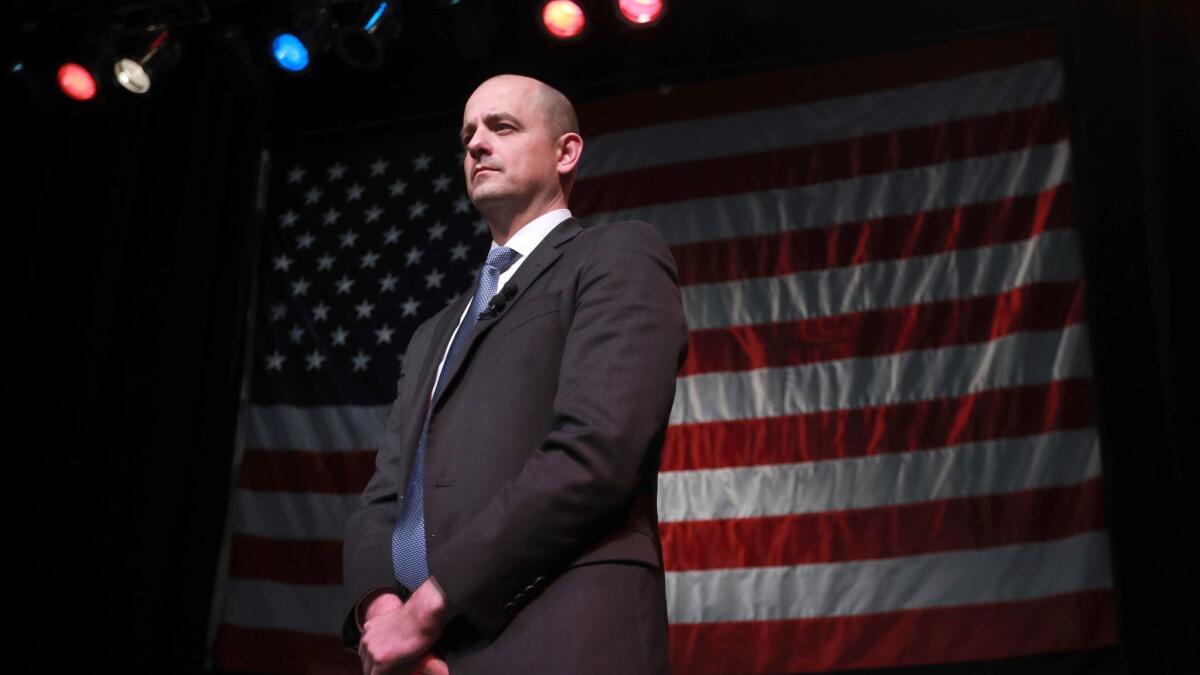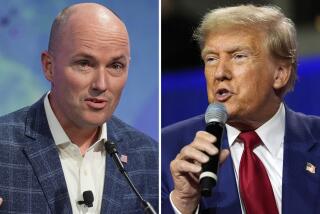In conservative Utah, Trump underperforms, but so does McMullin

- Share via
Reporting from Salt Lake City — Seeing Utah’s electoral votes go to the Republican candidate on election day in any other year, Logan Sisam would have gone to bed and felt pretty good about that fact.
Utah knew exactly what it was and he knew what he was: a Republican Mormon living in a conservative state.
Donald Trump upended all of that for him.
“The Republican Party is a burning house,” Sisam said. “When [vice presidential nominee] Mike Pence came and told us to come home, I thought, ‘I can’t come home to a house that’s on fire.’”
So the 37-year-old cast his ballot for Evan McMullin, the Utah native who was supposed to offer Mormons like Sisam a viable alternative to Trump and Democrat Hillary Clinton.
Mormons were disillusioned with Trump, Quin Monson, a political scientist at Brigham Young University, said, because he had made derogatory comments toward Muslims, used crude language and was caught on tape bragging about sexually assaulting women.
But McMullin, the former CIA operative and chief policy director of the House Republican Conference, simply ended up being a protest vote in Utah. Trump held 46.8% of the vote as of Wednesday. McMullin trailed Clinton by more than 7 percentage points with 20.4% of the vote.
“I think some McMullin voters who really didn’t like Trump ended up going back to him because their distaste for Clinton was so strong,” Monson said. “And when the race tightened nationally, they decided it was better to vote for Trump and not risk putting Clinton in a position to win.”
Trump underperformed too, Monson said: A Republican running in a successful campaign in Utah should be winning with more than 60% of the vote.
In 2012, Mitt Romney won the state with 72%. In 2008, John McCain picked up 62% of the vote. It’s “remarkable” that Trump was below 50%, Monson said.
“But it’s a footnote in history,” he added. “Trump won the state and McMullin ended up being of no consequence other than exposing a rift among Republicans in the state.”
The rift was first exposed when Romney urged voters to ditch Trump. He blasted Trump for his “Access Hollywood” tapes and avoided Trump’s nomination in Cleveland. Monson said Romney’s influence in the state contributed to the sub-50% vote total.
Greg Hughes, a Trump supporter and the state’s speaker of the House, said Romney’s stance was tough for him to square with the man he actively backed in 2012.
“It made it immediately harder for me,” Hughes said. “You have to go with your gut and do what you think is right, but I’d be lying if I told you it didn’t make it harder. Romney is held in such high regard and he showed such vim and vigor going against Trump — much more than he did going against Barack Obama.”
But Romney seemed to be open to Trump’s presidency Wednesday.
“Best wishes for our duly elected president,” Romney tweeted. “May his victory speech be his guide and preserving the Republic his aim.”
Not everyone was ready to get comfortable with Trump.
Karen McCabe, a longtime Republican, stood with her daughter at the McMullin headquarters in Salt Lake City on Tuesday night after Trump had won. She worried about the nominee’s temperament.
“It hasn’t quite sunk in that he won,” McCabe said. “Trump is still scary to me.”
She said she hoped McMullin would run for another statewide office or make another presidential bid in 2020.
Sisam, who posed for a selfie with his 10-year-old son in front of the dais where McMullin had addressed the supporters just moments before, said he thought McMullin’s calling was to start another party.
“The Republican Party is Donald Trump’s party, not my Republican Party,” he said. “I believe there is a need to return to our roots as a conservative party and I believe God will have a hand in this.”
More to Read
Sign up for Essential California
The most important California stories and recommendations in your inbox every morning.
You may occasionally receive promotional content from the Los Angeles Times.














